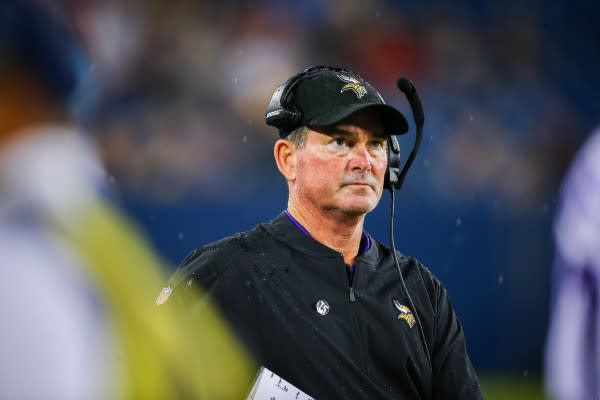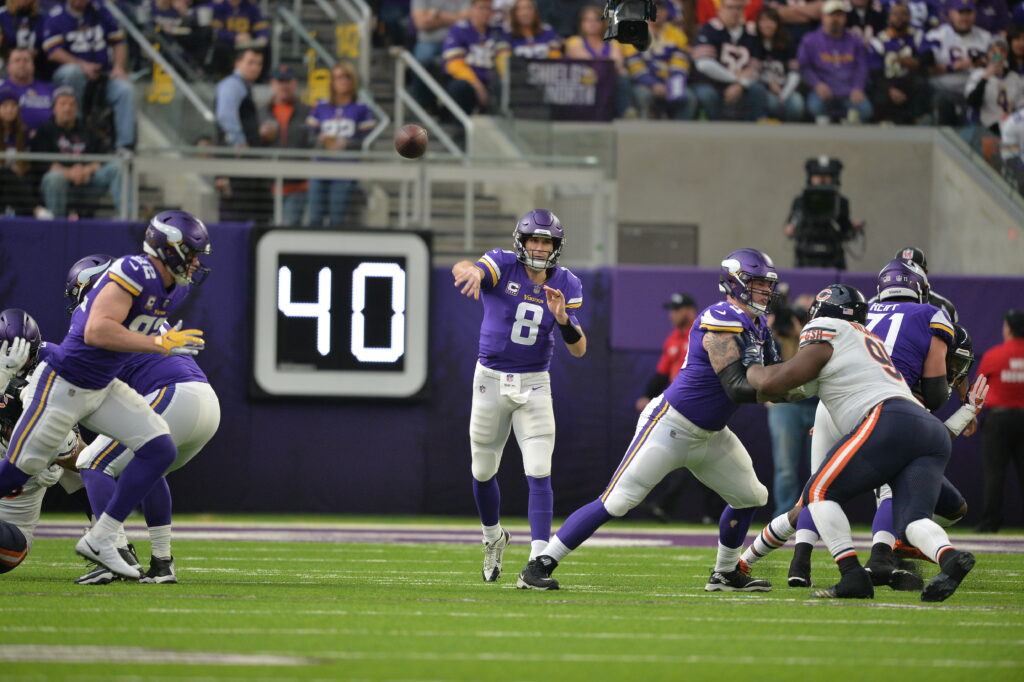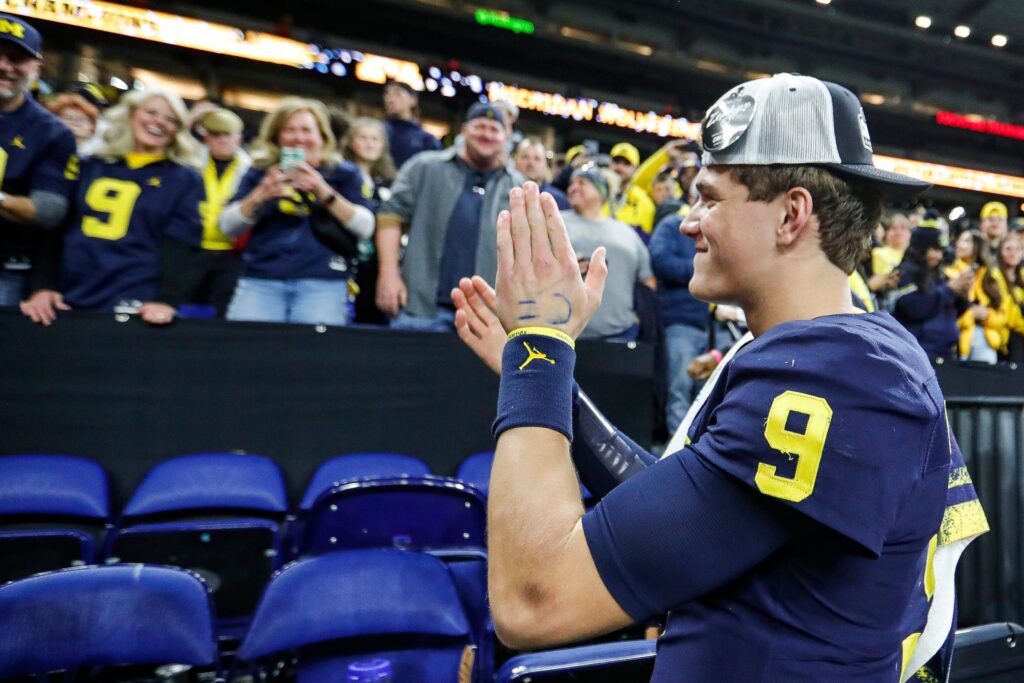
Matthew Coller is an experienced football writer who covered the Vikings for 1500ESPN and Skor North for four years. He is now writing a weekly Vikings column for Bring Me The News, and you can find more of his work at Purple Insider.
Throughout the history of the NFL, even the best coaches have faced scrutiny and pressure.
The league’s most recent Super Bowl winner Andy Reid, for example, was branded as a coach who could only take a team so far. After years of coming close in Philadelphia, Reid won just two playoff games in his first seven seasons in Kansas City. And then with Patrick Mahomes coming into his prime, everything clicked in the fourth quarter against San Francisco and Reid won his first Super Bowl after 20 years as a head coach.
Like Reid, Bill Cowher was labeled as good-not-great for a long time. He was named Pittsburgh’s coach in 1992 and didn’t win the Super Bowl until 2005. Tom Coughlin was on the hot seat in New York heading into both seasons in which he won championships. Even in Pittsburgh there are questions about Mike Tomlin, who won a Super Bowl early in his coaching career but hasn’t taken his team to The Big Game since 2010. He has been on year-to-year contracts despite an overall 133-74-1 record and impressive 8-8 season in 2019 after Ben Roethlisberger was lost for the year.
So Minnesota Vikings head coach Mike Zimmer may be “irked” about not having a long-term contract extension, per a report from Chad Graff of The Athletic, but it shouldn’t come as any surprise that the heat is on after a second straight year of failing to return to the NFC Championship game.
There has been significant pressure on Zimmer since the Vikings signed Kirk Cousins to an $84 million contract, setting the expectation bar sky high — definitely higher than 18 wins (and one playoff win) in two seasons. We can question whether the expectations are fair but the team’s owners spent to the brink of the salary cap to upgrade at quarterback and keep Zimmer’s defense together, including signing one of Zim’s favorite players Anthony Barr to a $67.5 million contract prior to 2019. They paid out with more in mind than a missed postseason and sixth seed in the playoffs.
If most of the roster from 2015-2019 was still together heading into 2020 and beyond, there would still be uncertainty about his future but it might be easier to sign up for continuity with Zimmer and his proven squad. This offseason, however, saw the roster turn over with the exits of Xavier Rhodes, Trae Waynes, Linval Joseph, Mackensie Alexander and Stefon Diggs, leaving the Vikings under the umbrella of a “retooling” team. That makes it more challenging to project whether a second winning window is on the way.
It isn’t impossible for a head coach to have two bites at the winning-window apple. Zimmer’s mentor Marvin Lewis managed to make his team relevant twice during his tenure in Cincinnati. Lewis took over in 2003 and immediately turned an abysmal franchise into a contender but by 2008 he’d missed the playoffs for three straight years. The Bengals stuck with him and Cincinnati made the postseason five years in a row between 2011 and 2015. After the 2015 season, the Bengals’ roster fell off again. This time they held on too long and slid to six, seven and six-win seasons from 2016-2018.
The Vikings’ current squad looks much more like a team under the category of up-and-coming than fading considering their success in the 2020 draft. But every year we are reminded by rookies that potential means you haven’t done anything yet.
If the Vikings ink Zimmer to a four or five-year extension, they are betting heavily that he will take a team that’s suddenly inexperienced at key positions like cornerback and wide receiver and get them back to being talked about as a “Super Bowl or bust” franchise. If they let him twist in the wind, they risk losing a very good coach after this season.
How can we go about figuring the right direction when history offers us many examples of both teams that cut loose good coaches too early and ones that picked the right time to make a change?
Just last year the Tennessee Titans moved on from Mike Mularkey to hire Mike Vrabel despite winning a playoff game in Mularkey’s final year and the Titans landed in the AFC Championship game. But the Detroit Lions might currently regret cutting ties too soon with Jim Caldwell, who went 36-28 before being fired in favor of Matt Patricia, who has gone 9-22-1 in two seasons.
Maybe the process for figuring out whether Zimmer is the proper coach for the future is as simple as giving him one year with the current club. But judging coaches on a year that had no offseason and has the potential to be a rollercoaster for the entire league doesn’t seem fair.
Rather than wait-and-see, the Vikings’ owners could ask themselves: What do they want from their head coach? Do they want a defensive guru who hasn’t been outside the top 11 in points allowed since 2010? Do they want a staff that has consistently developed late-round picks and undrafted players into key starters? Do they want a coach who has had different quarterbacks almost every year and still had them in contention? And do they want Gary Kubiak’s offense, which was the best of the Zimmer era last year?
Or are they looking for someone with an offensive background who operates a more wide-open, pass-first offense to go along with Kirk Cousins? Would they prefer a coach who isn’t quite as blunt with the media? Or a coach who will be active in social justice matters? A coach who is more analytics-friendly?
The question about Zimmer’s future isn’t as simple as looking at his .599 win percentage or impressive defensive numbers. It’s about projecting what’s right for the organization over the next five years.
It’s fine to be irked by the lack of an extension but the future of the head coaching position in Minnesota is more complicated than looking at Zimmer’s Pro-Football Reference page.






